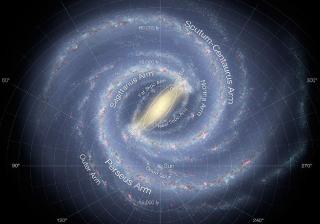Bibcode
Hammersley, P. L.; López-Corredoira, M.
Referencia bibliográfica
Astronomy and Astrophysics, Volume 527, id.A6
Fecha de publicación:
3
2011
Revista
Número de citas
32
Número de citas referidas
29
Descripción
Context. There is a continuing debate as to the form of the outer disc
of the Milky Way galaxy, which has important implications for
understanding the Galaxy's formation. Stars are known to exist at a
galacto-centric distance of at least 20 kpc. However, there is much
debate as to whether these stars can be explained as part of the disc or
whether another extragalactic structure, the so-called Monoceros
ring/stream, is required Aims: We examine the outer disc of the
Galaxy toward the anti-centre to determine whether the star counts can
be explained by the thin and thick discs alone. Methods: By using
Sloan star counts and extracting the late F and early G dwarfs, it is
possible to directly determine the density of stars out to a
galacto-centric distance of about 25 kpc. These are then compared with a
simple flared-disc model. Results: A flared-disc model is shown
to reproduce the counts along the lines of sight examined, if the thick
disc does not have a sharp cut off. The flare starts at a
Galacto-centric radius of 16 kpc and has a scale length of 4.5 ±
1.5 kpc Conclusions: Whilst the interpretation of the counts in
terms of a ring/stream cannot be definitely discounted, it does not
appear to be necessary, at least along the lines of sight examined
towards the anti centre.
Proyectos relacionados

Morfología y dinámica de la Vía Láctea
El Proyecto se estructura en dos partes, diferenciadas pero complementarias: morfología y dinámica. El estudio detallado de la morfología de la Vía Láctea pretende proveer una base de datos de distribución estelar en las regiones más alejadas y extintas de nuestra Galaxia, mediante el desarrollo de modelos semiempíricos a partir de la información
Martín
López Corredoira